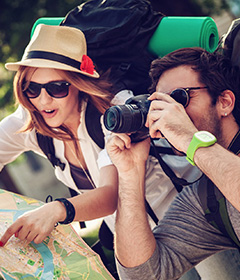In today’s consumer-driven world, the pursuit of happiness often leads us down paths paved with material possessions. However, a growing body of research suggests that experiences, particularly travel and recreational activities, may offer a more fulfilling and lasting sense of well-being. This shift in perspective challenges traditional notions of wealth and satisfaction, prompting us to reconsider how we allocate our resources for maximum life enrichment.
The allure of tangible goods is undeniable, yet their impact on our long-term happiness is surprisingly fleeting. In contrast, the memories and personal growth derived from travel and recreational pursuits seem to appreciate over time, much like a fine wine. This phenomenon has caught the attention of psychologists, economists, and neuroscientists alike, all seeking to understand why experiences trump materialism in the happiness equation.
Psychological impact of experiential vs. material purchases
The psychological benefits of experiential purchases over material ones are profound and multifaceted. When we invest in travel and recreation, we’re not just buying a service or a moment in time; we’re investing in ourselves. These experiences become part of our identity, shaping our worldview and contributing to our personal narrative in ways that a new smartphone or designer handbag simply cannot.
Research has shown that the anticipation of an upcoming trip can boost happiness levels for weeks or even months before the actual event. This pre-experience pleasure is often absent when it comes to material purchases. Moreover, the joy derived from experiences tends to increase over time as we reminisce and share our stories with others, creating a positive feedback loop of happiness.
Experiential purchases also foster social connections. Sharing an adventure or a new cultural experience with others creates bonds and memories that can last a lifetime. These shared experiences become topics of conversation and points of connection long after the event has passed, enhancing our social relationships and overall life satisfaction.
Neurological basis for long-term satisfaction in travel experiences
The brain’s response to travel and new experiences provides a fascinating insight into why these activities are so rewarding. Neuroscience reveals that novel experiences stimulate our neural pathways in unique ways, leading to enhanced cognitive function and emotional well-being.
Dopamine release patterns in novel environments
When we explore new places or engage in novel activities, our brains release dopamine, the ‘feel-good’ neurotransmitter associated with pleasure and reward. Unlike the short-lived dopamine spike from acquiring material goods, travel experiences can trigger sustained dopamine release, contributing to longer-lasting positive emotions and memories.
The novelty-seeking behavior associated with travel activates the brain’s reward system, encouraging us to continue exploring and learning. This neurochemical response reinforces the value of experiential purchases, as each new adventure primes our brain for further enjoyment and discovery.
Hippocampal engagement and memory formation during travel
The hippocampus, crucial for memory formation, becomes highly engaged during travel experiences. As we navigate new environments and create memories, this brain region works overtime, consolidating experiences into long-term memories that we can revisit and enjoy for years to come.
This heightened hippocampal activity explains why travel memories often feel more vivid and emotionally charged than memories of everyday life or material acquisitions. The unique combination of sensory inputs, emotional responses, and cognitive challenges encountered during travel creates rich, multifaceted memories that contribute significantly to our sense of personal growth and life satisfaction.
Neuroplasticity enhancement through cultural immersion
Exposure to different cultures and ways of life during travel can enhance neuroplasticity—the brain’s ability to form new neural connections. This increased neural flexibility can lead to improved problem-solving skills, creativity, and adaptability in various aspects of life.
Cultural immersion experiences challenge our preconceptions and push us out of our comfort zones, fostering cognitive flexibility and emotional resilience. These neural adaptations can have far-reaching benefits, improving our performance in both personal and professional spheres long after we’ve returned home.
Stress reduction via nature exposure in recreational activities
Many travel and recreational activities involve exposure to natural environments, which has been shown to have significant stress-reducing effects on the brain. Nature experiences can lower cortisol levels, reduce activity in the prefrontal cortex associated with negative rumination, and activate the parasympathetic nervous system, promoting relaxation and well-being.
The restorative effects of nature exposure during travel can lead to improved mood, enhanced cognitive function, and better overall mental health. These benefits often extend beyond the duration of the trip, contributing to long-term stress resilience and life satisfaction.
Economic analysis: ROI of travel vs. depreciating material goods
From an economic perspective, the return on investment (ROI) of travel and recreational experiences often outweighs that of material purchases. While material goods typically depreciate in value over time, the perceived value of experiences tends to appreciate, offering a unique form of ‘experiential compound interest’.
Hedonic adaptation in consumer goods ownership
Hedonic adaptation, or the tendency to quickly return to a baseline level of happiness after acquiring new possessions, is a significant factor in the diminishing returns of material purchases. We often overestimate the long-term satisfaction we’ll derive from material goods, leading to a cycle of consumption that fails to deliver lasting happiness.
In contrast, experiences are less subject to hedonic adaptation. The variety and uniqueness of travel experiences make them resistant to the ‘hedonic treadmill’ effect, allowing us to derive continued pleasure from our memories and the personal growth we’ve achieved.
Value retention in skill acquisition from travel experiences
Travel and recreational activities often involve learning new skills or improving existing ones. Whether it’s learning a new language, mastering a sport, or developing cultural competence, these skills have tangible value that extends far beyond the experience itself.
These acquired skills can enhance our professional capabilities, broaden our perspectives, and increase our adaptability in various life situations. Unlike material possessions, which often become obsolete or lose value, the skills and knowledge gained through travel experiences appreciate over time and can lead to new opportunities and personal development.
Long-term financial benefits of network expansion through travel
The social connections formed during travel can have significant long-term financial benefits. Networking opportunities arise naturally when exploring new places and engaging in shared experiences. These connections can lead to professional collaborations, job opportunities, or valuable insights that may not have been accessible otherwise.
Moreover, the global perspective gained through travel can enhance one’s ability to navigate an increasingly interconnected world economy, potentially leading to career advancements and entrepreneurial opportunities that far outweigh the initial investment in travel experiences.
Social capital accumulation through travel and recreation
Travel and recreational activities are powerful generators of social capital—the networks of relationships among people that enable a society to function effectively. The shared experiences, stories, and connections formed through travel contribute to a rich tapestry of social interactions that enhance our personal and professional lives.
These social bonds created through shared experiences often prove more durable and meaningful than those formed through shared material interests. The stories we tell about our travels become part of our social currency, fostering deeper connections and opening doors to new relationships and opportunities.
Furthermore, travel exposes us to diverse perspectives and cultures, enhancing our empathy and cultural intelligence. This increased social awareness can lead to improved interpersonal skills, better communication abilities, and a broader worldview—all valuable assets in both personal and professional spheres.
Environmental and cultural sustainability of Experience-Based consumption
As global consciousness shifts towards sustainability, the environmental impact of our consumption choices comes under scrutiny. Experience-based consumption, such as travel and recreation, often presents a more sustainable alternative to the continuous acquisition of material goods.
Carbon footprint comparison: travel vs. material production
While travel does have an environmental impact, particularly in terms of transportation emissions, it’s important to consider this in the context of the overall carbon footprint of consumer goods production. The lifecycle emissions associated with manufacturing, packaging, and disposing of material goods can be significant and ongoing.
Responsible travel practices, such as choosing eco-friendly accommodations, participating in conservation activities, and supporting local sustainable initiatives, can mitigate the environmental impact of travel. Moreover, the educational aspect of travel often leads to increased environmental awareness and more sustainable lifestyle choices upon returning home.
Cultural preservation through responsible tourism
Thoughtful travel can play a crucial role in cultural preservation. When tourists engage respectfully with local communities and traditions, it can help support and revitalize cultural practices that might otherwise be lost to globalization. This cultural exchange benefits both travelers and host communities, fostering mutual understanding and appreciation.
Responsible tourism can provide economic incentives for communities to maintain their cultural heritage, traditional arts, and customs. This form of cultural sustainability is a unique benefit of experiential consumption that material goods cannot match.
Economic distribution in local communities via tourism
Travel and recreational activities often distribute economic benefits more directly to local communities than the purchase of material goods. When travelers engage with local businesses, artisans, and service providers, it creates a more equitable economic impact, supporting diverse livelihoods and fostering community development.
This direct economic injection into local economies can lead to improved infrastructure, educational opportunities, and quality of life for residents in tourist destinations. The multiplier effect of tourism spending can far outweigh the economic impact of purchasing imported consumer goods.
Digital age impact on experience valuation and sharing
The digital revolution has significantly influenced how we value, share, and even augment our travel and recreational experiences. Social media platforms, virtual reality technologies, and blockchain innovations are reshaping the landscape of experiential consumption.
Social media’s role in experience amplification
Social media platforms have become powerful tools for sharing and reliving travel experiences. The ability to instantly share photos, videos, and stories with a wide audience extends the enjoyment of travel beyond the actual experience. This digital sharing creates a form of social currency that can enhance personal relationships and social status in ways that material possessions often cannot.
Moreover, the anticipation and planning phases of travel are now enriched by social media, allowing potential travelers to gather inspiration, tips, and recommendations from a global community of fellow adventurers. This enhanced pre-trip engagement adds another layer of enjoyment to the overall travel experience.
Virtual reality and augmented reality in travel experience enhancement
Virtual Reality (VR) and Augmented Reality (AR) technologies are revolutionizing how we plan, experience, and remember travel. VR can provide immersive previews of destinations, helping travelers make more informed decisions about their trips. AR applications can enhance on-site experiences by overlaying historical information, translations, or interactive elements onto real-world environments.
These technologies also offer ways to revisit and enhance travel memories after returning home. VR recreations of visited locations or AR-enhanced photo albums can reignite the emotions and sensations of past trips, prolonging the psychological benefits of travel experiences.
Blockchain technology in travel reward systems and loyalty programs
Blockchain technology is beginning to transform travel reward systems and loyalty programs, offering more transparent, flexible, and valuable incentives for experiential purchases. Tokenized reward points can provide greater liquidity and transferability, allowing travelers to maximize the value of their loyalty investments.
Smart contracts on blockchain platforms can automate and personalize travel experiences, from seamless hotel check-ins to customized tour packages. This technology has the potential to make experiential purchases more efficient, secure, and tailored to individual preferences, further enhancing their value proposition compared to material goods.
The integration of blockchain in the travel industry also opens up new possibilities for decentralized travel services , potentially reducing costs and increasing options for consumers while ensuring more equitable distribution of profits within the industry.
As we navigate the complexities of modern life, the choice between investing in experiences or material goods becomes increasingly significant. The multifaceted benefits of travel and recreation—from psychological well-being and neurological stimulation to economic value and social capital—present a compelling case for prioritizing experiences over possessions. In a world where sustainability and personal growth are becoming paramount, the intangible riches gained through travel and recreational pursuits offer a path to a more fulfilled, connected, and meaningful life.


